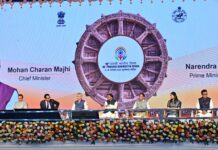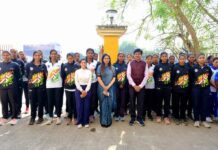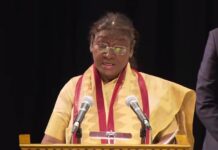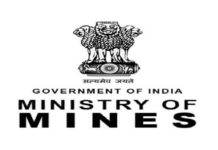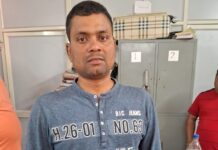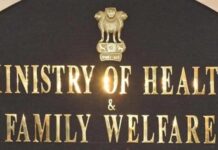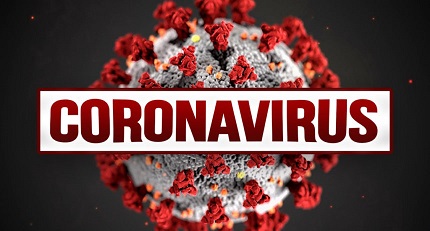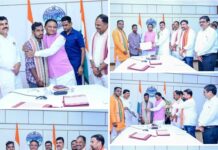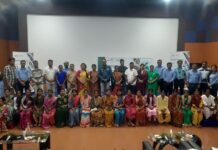By Our Correspondent
NEW DELHI/ BHUBANESWAR: The 17th meeting of the high-level Group of Ministers (GoM) on COVID-19 was held under the chairpersonship of Dr. Harsh Vardhan, Union Minister of Health & Family Welfare by a video-conference hosted at Nirman Bhawan, on Saturday. He was joined by Dr S. Jaishankar, Union Foreign Minister, Hardeep S. Puri, Union Minister of Civil Aviation, and Ashwini Kumar Choubey, Minister of State, Health & Family Welfare.
Preeti Sudan, Health Secretary, Rajesh Bhushan, OSD (MoHFW), Amitabh Kant, CEO (Niti Aayog), P D Vaghela, Secretary (Pharma), Parameswaran Iyer, Secretary (DWS), Dr Rajiv Garg, DGHS (MoHFW), Arti Ahuja, Additional Secretary (MoHFW), Dammu Ravi, Additional Secretary (MEA), Dr S K Singh, Director (NCDC) participated through virtual media.
The GOM was briefed on the current status of COVID-19 cases in the country, the recovery and mortality rates, doubling rate, ramped up testing and strengthened healthcare infrastructure in the various states. It was mentioned that presently eight States (Maharashtra, Tamil Nadu, Delhi, Telangana, Gujarat, Uttar Pradesh, Andhra Pradesh and West Bengal) contribute 85.5% of active caseload and 87% of total deaths in India.
It was also informed that, as on date, 15 Central Teams consisting of public health experts/epidemiologists/clinicians and a senior Joint Secretary level have been deployed to provide technical support to the States. Another Central Team is currently visiting Gujarat, Maharashtra and Telangana to strengthen ongoing efforts for management of COVID-19. The GoM was also briefed about the utility of ITIHAS and Aarogya Setu in contact tracing and prediction of potential hotspot areas which have been extensively used by State/UT Governments in preparing the COVID-19 containment strategy.
The Group of Ministers was informed that the key focus areas which are continually communicated to the States/UTs are strict containment measures and surveillance; utilizing full testing capacity; focus on monitoring of co-morbid and elderly population; predicting emerging hotspots leveraging digital tools such as Aarogya Setu; ensuring seamless patient admission processes; fatality mitigation by effective clinical management; focus on infrastructure preparedness (critical care beds, oxygen, ventilators and logistics); and ensuring that non-Covid healthcare services are not impacted.
Dr. Bhragava, DG (ICMR) gave a detailed presentation on the Testing strategy of ICMR. He explained about the serological survey, and the increasing capacity for enhanced per day testing through various tests. The samples tested in the last 24 hours have increased to 2,20,479 taking the total cumulative number of samples tested, as on date, to 79,96,707. India now has 1026 diagnostic labs dedicated to COVID-19. This includes 741 in the government sector and 285 private labs, he stated.
GoM was also apprised about the growing medical infrastructure in the country and was informed that as of 27th June 2020, the COVID related health infrastructure has been strengthened with the availability of 1039 dedicated COVID Hospitals with 1,76,275 isolation beds, 22,940 ICU beds and 77,268 oxygen supported beds; 2,398 dedicated COVID Health Centres with 1,39,483 Isolation beds, 11,539 ICU beds and 51,321 oxygen supported beds have also been operationalised. Moreover, 8,958 COVID Care Centres with 8,10,621 beds are now available to combat COVID-19 in the country. The Centre has also provided 185.18 lakh N95 masks and 116.74 lakh Personal Protective Equipments (PPEs) to the States/ UTs / Central Institutions.
In a detailed presentation by K. Shivaji, Chairman of the Empowered Group-10, the GoM was briefed that the stipulated redressal time on COVID-19 public grievances was brought down from the usual 60 days for normal public grievances to three days to prioritize their quick disposal. National Dashboard for ‘COVID -19’ was launched on 1st April 2020 for exclusive monitoring of COVID-19 public grievances. During the period from 30th March to 24th June, 2020, the Empowered Group disposed 93.84% of the 77,307 grievances received for central Ministries and 63.11% of the 53,130 grievances received pertaining to the State governments.



